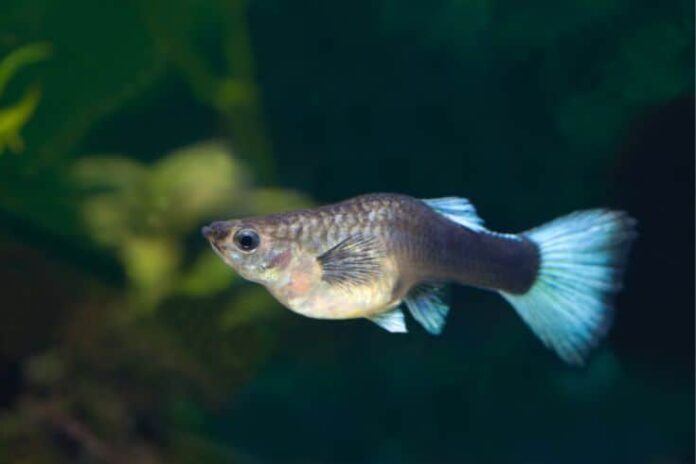When it comes to guppies, perhaps the most frequently asked question is whether they lay eggs or not. Guppies are a type of freshwater fish that are relatively easy to keep and are a favorite choice for aquariums. Although guppies do not lay eggs like most other fish species, they still reproduce using an interesting technique that sees the male internally fertilize the female's eggs.
In this article, we will concentrate on how guppies reproduce and some common phenomena that resemble laying eggs. By the end of the article, you will have a better understanding of how your guppy's reproductive system works!
Do Guppies Lay Eggs?
The tentative answer to this question is no – guppies don't lay eggs – at least not in the usual way. Most fish species lay fertilized eggs outside the mother's body, with both female and male fish releasing sperm and eggs into the water, where they mix to form clusters of fertilized eggs that eventually hatch.
However, guppies reproduce by giving birth – meaning their growing young are inside their mother until they can be born. However, there are several possibilities for female guppies appear to place eggs. We will discuss some examples below, although they are not the same as fish eggs in general.
In short, guppies usually don't lay eggs. They provide resources to stay young, as do mammals such as humans and cats. In fact, they are not the only round-shaped fish – other tropical fish, such as mollies, also reproduce using this technique. Let's take a closer look at how guppies reproduce, and the unusual circumstances that cause guppies to appear to lay eggs.
Guppy Breeding Habits
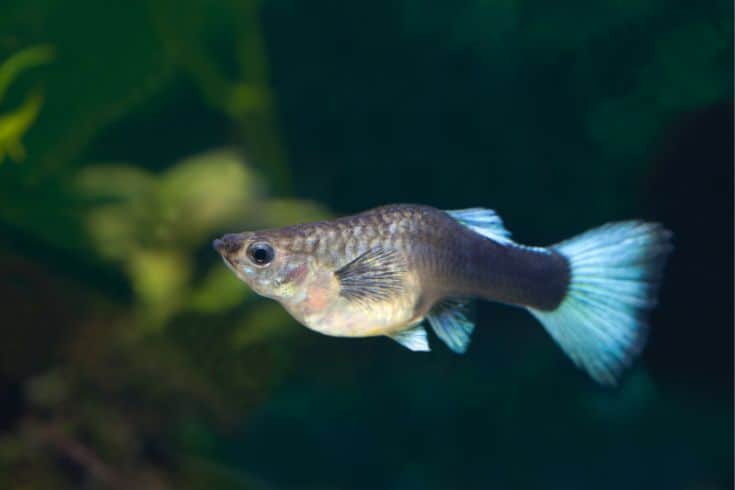

OK, so we know that guppies don't usually lay eggs. However, how do guppies actually reproduce? Well, as you might have guessed, female guppies must be mated with male guppies to ensure that the female guppy can get pregnant.
Guppies reach sexual maturity at around 8 weeks of age, after which the mating process can begin. The male guppy will approach the female and try to seduce her, by showing off his bright fins and tail. If the female is receptive, the male will use his pelvic fins (or gonopodium) to insert sperm into the female's body. This fertilizes the guppy eggs that are already inside him.
The female fish then carries the fertilized eggs inside her body until they are ready to be born. As her pregnancy progresses, her gravid spots (which are dark spots on her lower body) will become more visible. These spots will get bigger as the pregnancy progresses. The gestation period for guppies is usually around 28 days, after which the fry (young guppies) will be born.
How Do Guppies Sometimes Give Starters?
One thing that is quite unique about the breeding habits of guppies is that guppy parents can produce a supply of as many as six individuals in one mating. Considering {{that}} pregnant guppies can provide a supply of between 10-120 guppy fry each time they give birth, you will likely produce 100 offspring month after month, per fish! It's no wonder that guppies have earned a reputation as prolific breeders!
In fact, not all young guppies develop like adults – many succumb to predatory tank mates or live in unfavorable conditions. However, because guppy parents reproduce at a high rate, the guppy population in the aquarium can grow in a short time. When it comes to tropical fish, guppies are easy to breed, making them a favorite among novice fish owners.
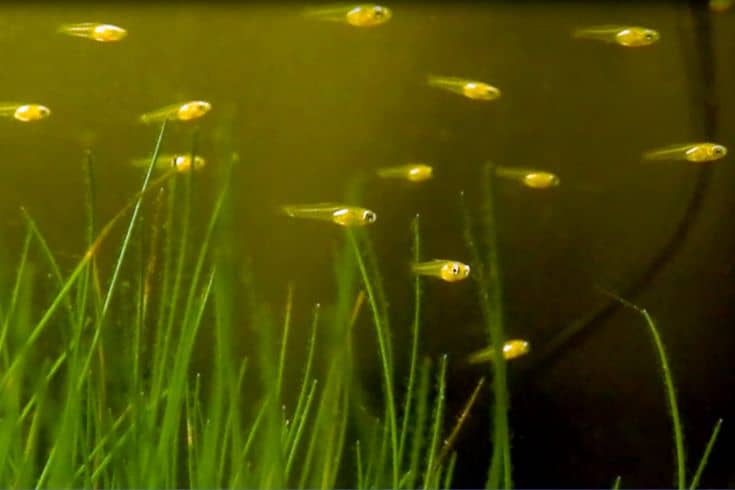

One important caveat is the need for balance between women and men. Females should outnumber males to prevent males from becoming too aggressive in pursuing female guppies. The overwhelming ratio to intent is one man for every three women. This also maximizes your chances of growing profitably.
Do Guppies Lay Eggs? Unusual Circumstances
So, do guppies lay eggs under any conditions? Successful, positive – something like that. Let's take a closer look at the unusual circumstances that cause guppies to appear to lay eggs.
Undeveloped Eggs Are Being Released
Female guppies sometimes appear as if they are laying eggs, when in fact they are only releasing undeveloped eggs. This usually occurs due to poor water pressure or conditions. A guppy also carries these eggs inside itself, but the eggs do not become seeds. Instead, the female's body rejects it, turning it into a white, slimy substance that she then excretes.
This is most likely to happen to female guppies regardless of age, but it often happens to fish that are abused. Most guppy lovers can attest to guppies' need for clear, clear water and an eco-friendly environment. That's why a good aquarium repair routine, supported by eco-friendly filters, good heating, and regular water conditions, is so important in keeping guppies healthy and happy.
Another reason why undeveloped eggs are released is because the guppy has just been moved, or is dealing with aggressive tank mates. Stress can be found in many forms and variations, so it is important to manage your fish and observe their habits. Consider what, if any, changes have been made to the current tank that might create stress.
Stillborn Fries Mistaken for Eggs
No matter how hard we try, our attempts to breed guppies usually end in stillborn babies. Mortality rates for young guppies vary, but tend to be higher if the aquarium is too full or the water quality is poor. Pregnant guppies kept in suboptimal conditions still have to provide a supply of seeds, but the seeds will not survive.
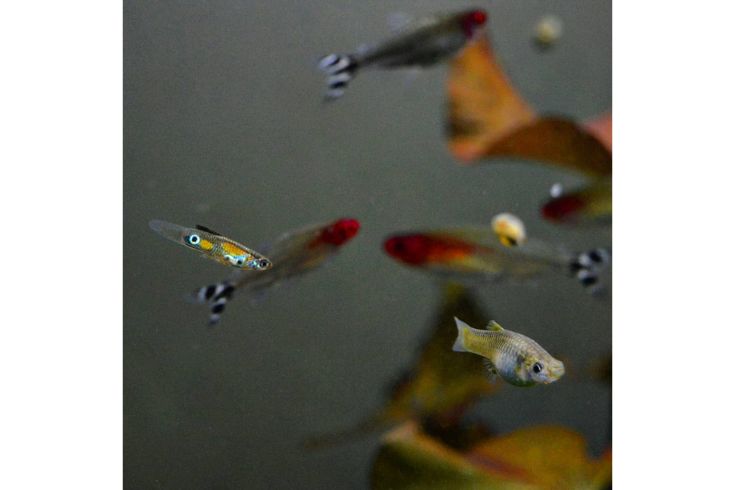

This means that, usually, what looks like a guppy laying eggs could actually be a guppy releasing its dead fry. These stillborn guppy fry may be only a fraction of the size of normal guppy fry and may look like small white eggs. Of course, they were undeveloped guppies and did not make it to the fry stage due to unfortunate circumstances.
To prevent this from happening, make sure to check your water conditions at least weekly and try to keep your guppies in the right environment. And if your female guppy has been providing a supply of stillborn fry, please consider placing them in a separate, more acceptable environment. This will help it recover and give it a better chance of eventually providing a healthy seed supply.
Snuggling Guppy Fries
Healthy guppy fish are not born as eggs, but are fully formed and can swim. Your fry may only be about 1/4 inch across, but in general, you can tell that they are actually seeds and not eggs. Not only do they have tiny black dots in place of their eyes, but they may even be round in shape. It's a lot of fun, and really encouraging to see!
However, if your seeds curl up during stocking, they may be mistaken for eggs. Sometimes, guppy fry are also born curled up and, depending on their size, can look like white eggs. That's usually the result of complicated or premature supply. Although some fry born under these conditions may still survive, they are more likely to experience developmental factors.
In short, healthy guppies do not lay eggs. If your guppy lays eggs or undeveloped fry, it could be a sign that something is wrong in the tank. In these cases, you should seek expert recommendations as quickly as possible, and take the appropriate steps to create a healthier, more regulated environment for your minnows.
FAQs
Are Livebearing Fish More Profitable Than Egg-Dispersing Fish?
Of course, live fish have an advantage over fish that scatter eggs because they can nurture and protect their young before they hatch. Fish eggs are generally left exposed to predators, and egg scattering is no different than that of grazing fish to protect their young.
Live fish even have a shorter gestation period, allowing them to reproduce before their eggs are dispersed. This makes them better suited to environments that are volatile or have limited resources. Guppies and mollies are known as excellent live fish and are widespread among aquarium owners due to their hardy nature.
The final advantage of live fish is that they will produce more fry than scattered eggs. This means you'll get extra fry from one female guppy or molly, which is great for aquarium hobbyists trying to breed fish. However, it is always best to consider the dimensions of your aquarium when considering what type of fish to keep.
How Long Will It Take for Your Guppies to Get Started?
Although the gestation period of guppies can fluctuate, most female guppies will usually give birth within a month of fertilization. The correct technique for providing seed supply or “drop” usually lasts between 4-6 hours. As expected, this can be a physically demanding process for the parent fish, and can have a detrimental impact on its health.
When Do Guppies Reach Sexual Maturity?
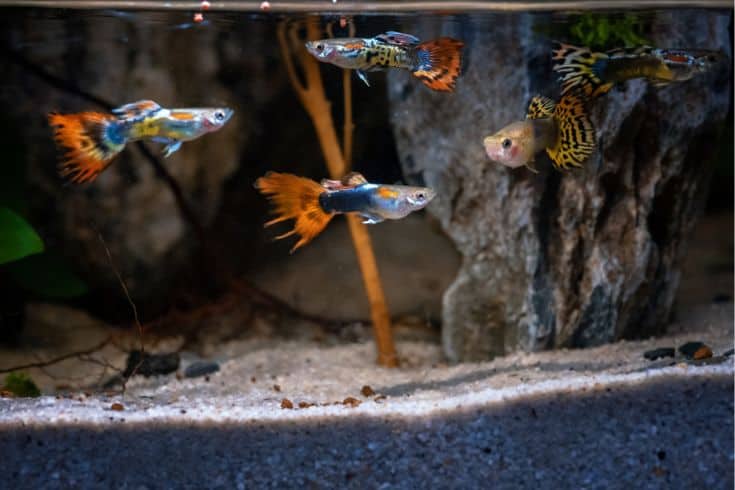

Guppies reach sexual maturity between 8-14 weeks, depending on the size and quality of each fish. Male guppies can reach sexual maturity earlier than female guppies, so they will start to show more aggressive behavior, such as chasing or biting female guppies in the aquarium.
In conclusion
In conclusion, guppies usually do not lay eggs. However, unhealthy female guppies may lay undeveloped fry or “eggs” that look like small white eggs. If you find this happening in your aquarium, it is important to take steps to strengthen the environment for your fish, as unfavorable water conditions can trigger this case.
We hope this text helps clarify the question of whether guppies lay eggs or not! As always, it is likely that you have other questions or points regarding your fish, it is best to seek recommendations from an environmental expert. Good luck with your tank!
